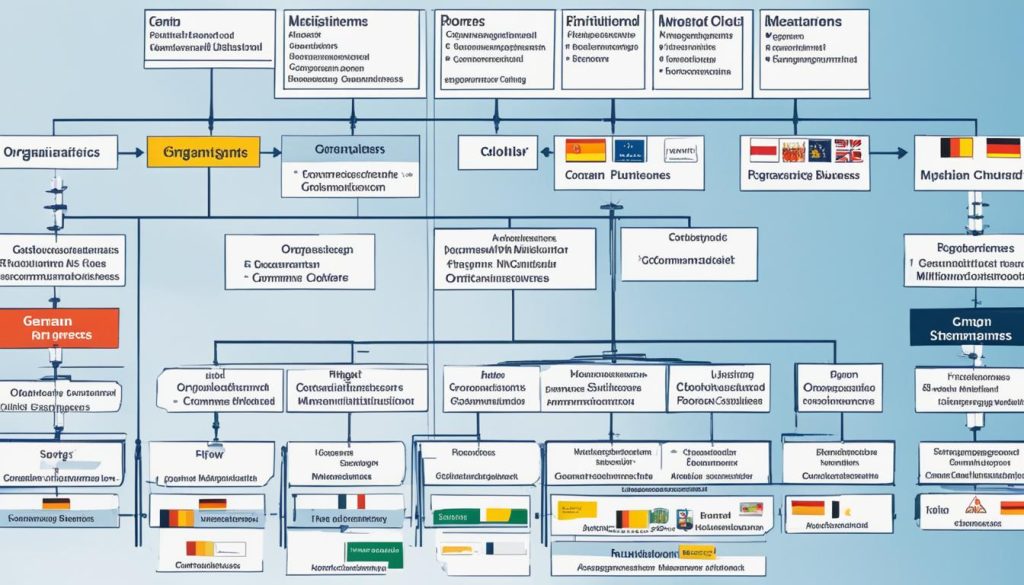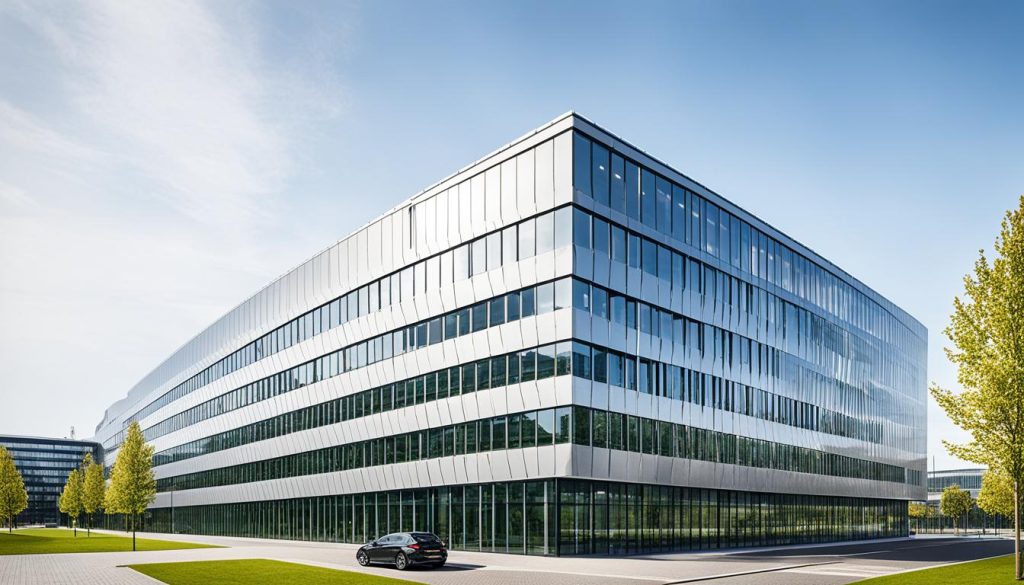In today’s global market, knowing the differences between German businesses and multinationals is fascinating. Firms need this knowledge to improve their strategies and business models.
German companies are known for their great attention to detail. They value precision and high quality. On the other hand, multinationals are all about diversity, being flexible, and reaching more markets. They adapt to different cultures and economies. These differences help us understand how each business succeeds globally.
Key Takeaways
- German business practices focus on quality and precision.
- Multinational companies excel in diverse workforces and market adaptability.
- Understanding cultural nuances is crucial for global business distinctions.
- Market strategies differ significantly between German businesses and multinational enterprises.
- Each business model has unique strengths and challenges in the global market.
Understanding German Business Culture
The German corporate culture stands out due to its formality and well-organised nature. Directness and always being on time are very important. These qualities lead to efficiency and productivity at work.
Direct and clear communication is a key part of German business etiquette. Germans prefer to be straightforward and honest. This way of exchanging ideas is important when working with companies from other countries.
For companies entering the German market, it’s vital to understand these cultural differences. The German business environment loves detailed planning and strict adherence to processes. Knowing the local way of doing things can make interactions smoother.
Reliability and exactness are highly valued in Germany. This is seen in meetings and daily work, where being punctual and disciplined is essential.
Getting used to the German way of communicating helps build strong business ties. It’s important to understand these cultural details to work well together. This ensures that all partners know what’s expected in the German business world.
| Aspect | German Approach |
|---|---|
| Communication Style | Direct and Honest |
| Business Etiquette | Formal and Structured |
| Cross-Cultural Interactions | Clear Expectations |
| German Market Entry | Knowledge of Local Conventions |
Learning about German corporate culture, from how they talk to their business manners, makes working there much smoother. These practices ensure respect, efficiency, and success when interacting across cultures.
Key Characteristics of German Businesses
German businesses are known for making top-quality products. Their work culture deeply values this commitment. It leads to a reputation for unmatched quality and precision.
Quality and Precision
At the center of each German business is a strong focus on quality. Each product has to meet very high standards. Companies like BMW and Mercedes-Benz in cars, and Miele in home goods, pay close attention to every detail.
This focus means products often go beyond what customers expect. It shows just how important German engineering is.
Engineering Excellence3>
Germany leads in engineering because of its excellent education and ongoing research. The country is full of new patents and tech discoveries. Innovators like Siemens and Bosch use their engineering know-how to find new solutions. This blend of exact manufacturing and innovation keeps Germany ahead globally.
Work-Life Balance
German work culture also cares a lot about employee happiness. Companies offer flexible hours and long holidays. This approach makes employees happier and more productive, leading to lasting business success.
German firms really focus on policies that help their staff. They know that happy employees are key to keeping up high standards.
What is German vs multinational business?

Comparing different business models shows us how German and multinational companies differ. German businesses focus on quality, precision, and sustainability within their local market. Meanwhile, multinational corporations (MNCs) spread their operations worldwide, balancing global and local market needs.
German firms are known for strong corporate governance, valuing transparency and ethics. This approach makes them reliable and sets high standards. On the other hand, MNCs mix uniformity with local taste across regions, using an international strategy to achieve this.
German companies often lead in niche markets with their top-notch products. They gain a strong reputation worldwide. Multinationals, however, target both mass and niche markets. This strategy boosts their global presence and market share.
The way German firms and MNCs are governed also varies. German companies usually have a dual-board system, ensuring strict oversight. Multinationals may have more flexible governance structures, adapting to both global and local demands.
These differences underline the unique strategies of German and multinational companies. Grasping these contrasts helps explain their market roles and effectiveness.
Operational Strategies in German Companies
German companies are known for their detailed approaches to stay ahead. They focus on lean manufacturing and strong research and development. This leads to efficient production and business innovation.
Lean Manufacturing
Lean manufacturing is key in German firms. It helps get rid of waste and improve processes. This way, companies are more effective and produce quality products, keeping them ahead globally.
Research and Development Focus
German businesses invest a lot in R&D. This is crucial for bringing in new ideas and staying technologically advanced. Their commitment to research and development leads to new and innovative products.
Germany combines lean manufacturing with a strong focus on R&D. This mix leads to operational excellence. It drives production efficiency and innovation, making Germany a leading force in industries worldwide.
| Operational Strategy | Key Benefits |
|---|---|
| Lean Manufacturing | Enhanced efficiency in production, cost reduction, high-quality outcomes |
| R&D Investment | Pioneering innovation in business, technological advancements, sustainable competitive advantage |
Multinational Business Practices
In today’s connected world, multinational corporations face challenges. They deal with workforce diversity, global trade strategies, and market entry plans. Understanding their balance between keeping things uniform and adapting products is key.
Diverse Workforces
Many multinational corporations have a wide variety of staff from different cultural backgrounds. This diversity sparks innovation and strengthens problem-solving. For instance, companies like Unilever and Microsoft gain from having diverse talents. This leads to a blend of ideas and solutions that push the company forward.
Global Market Penetration
To succeed in new markets, careful planning is a must. Firms use methods like joint ventures and franchising. Look at McDonald’s; it tweaks its menu for each country. Yet, it keeps its worldwide identity. This combination keeps McDonald’s competitive and attractive around the globe.
Standardisation and Customisation
Multinationals face a big challenge in keeping their brand consistent yet adapted to local markets. Take Apple as an example. It designs its products to be the same worldwide. However, it customises apps and content for each region. This ensures Apple delivers a tailored experience to customers everywhere.
| Aspect | Example | Benefit |
|---|---|---|
| Workforce Diversity | Unilever, Microsoft | Enhanced innovation and problem-solving |
| Market Entry Tactics | McDonald’s | Localized products within a global brand |
| Business Standardisation and Product Customisation | Apple | Consistency with localised appeal |
Management Styles: German vs Multinational

German businesses and multinational companies show a fascinating contrast in management styles. German leadership strongly focuses on structure and clear hierarchies. This creates a culture known for its reliability and exactness. Their management practices are marked by careful decision-making, ensuring thorough checks at all levels.
On the other hand, multinational firms prefer flexible and adaptable management to handle international complexities. They support quick decision-making and less rigid structures. This promotes quick reactions to market changes. Leadership in such firms values teamwork and different viewpoints to spark innovation and compete globally.
Additionally, Germans value clear communication and consistency in their organisational behaviour. This complements their systematic management approach, contributing to their success. In contrast, multinationals find a middle ground between consistency and adaptability. This helps them cater to different cultures and markets worldwide.
| Aspect | German Management Style | Multinational Management Style |
|---|---|---|
| Hierarchy | Well-defined and structured | Decentralised and flexible |
| Decision-Making | Meticulous and thorough | Collaborative and rapid |
| Communication | Clear and consistent | Dynamic and inclusive |
| Leadership | Reliability and precision-focused | Innovative and agility-focused |
For business leaders worldwide, it’s important to understand these management differences. It helps them adapt their strategies to either German precision or multinational flexibility. Knowing the unique styles can improve effectiveness and success in the global market.
Leadership Approaches in German Businesses
Grasping the unique leadership formulas in German businesses is crucial for understanding their success. These models put a strong focus on a well-organised hierarchy and consensus-building. This approach ensures everyone works together towards common goals.
Hierarchy and Structure
In Germany, companies have a clear and strict structure. This makes sure each person knows their duties and who they report to. It helps in making decisions quickly and effectively. This system shows the value Germans place on order and discipline in the workspace.
Consensus Decision-Making
Even with a stiff business hierarchy, German firms highly value teamwork in making decisions. Leaders take opinions from different levels before making big choices. This way, decisions are well-thought-out, benefiting from everyone’s insights.
Leadership Approaches in Multinational Corporations
Effective leadership is key in multinational corporations to navigate global business challenges. These organizations use global leadership strategies to push their vision and ensure all regions align.
Recognizing and respecting cultural diversity is a basic part of managing multinationals. Leaders work to create an inclusive setting where all team members feel valued. They blend cultural differences to improve team work and outcomes.
Setting up strong corporate plans that match organisational goals is crucial. These plans guide decision-making and help different parts of the business work together. Clear communication of these plans ensures everyone works towards the same goals.
Decision-making in multinationals must balance central control and local control. Leaders need to delegate effectively while overseeing the whole process. This lets local managers meet specific regional needs without losing sight of the company’s overall goals.
Using technology and data analysis is also vital in modern leadership. It helps leaders monitor performances worldwide, spot trends, and make informed decisions. This use of technology leads to better efficiency and a competitive edge.
Ultimately, to lead effectively in multinationals, you need strategic vision, cultural understanding, and tech know-how. With these global leadership strategies, multinationals can thrive in the global marketplace.
Human Resources in German vs Multinational Businesses

HR management in German firms differs from multinational companies. They vary in teaching workforce skills, keeping employees happy, and holding onto staff.
Training and Development
German firms value formal training like apprenticeships and ongoing learning. This makes sure their staff are well-trained and know their jobs well. Meanwhile, multinational companies mix local and global training. This helps keep things the same in all their offices.
| Aspect | German Businesses | Multinational Corporations |
|---|---|---|
| Training Format | Formal Apprenticeships | Global Training Programmes |
| Skills Development | Highly Specialised | Blended Global Standards |
| Professional Growth | Continuous Development | Cross-Cultural Opportunities |
Employee Engagement
German companies build loyalty with job security and a strong team spirit. On the other side, multinational firms offer various things to keep staff. They have good pay, chances to move up, and welcoming offices.
- Job security mechanisms
- Strong corporate culture
- Career advancement opportunities
- Competitive compensation packages
- Inclusive workplace environments
To manage staff well, companies need to grasp the different ways HR works in German and global firms. By matching the right approach to keeping staff happy and skilled, businesses do better in handling their teams.
Technological Integration and Innovation
In today’s fast-paced business world, companies are changing the way they work by integrating technology. German firms, famous for their detailed work and engineering skills, are digital to stay ahead. They use technology in various fields to work better and bring new ideas.
Big global companies are also putting a lot of money into new tech to make their work smoother and reach more customers. This step towards using tech is key for growing and entering new markets worldwide. By using advanced tech, they can offer tailor-made products and keep up high quality everywhere.
Both German and global companies are seeing big changes in how they do their work because of technology. Adding new tech like artificial intelligence and the Internet of Things is not just making tasks easier but also creating new ways of doing business. These tech advances are important for bringing in new ideas and making companies stand out.
When thinking about adding new tech, companies need to check their current setups and add new tech that fits their needs. This planning helps in perfectly adding new tools that improve work. German companies focus on adding tech that matches their aim for precision, while big international firms use tech in a broader way, all over the world.
The way companies bring in new tech will shape the business world of the future. Being able to mix in new tech well will be crucial for lasting success and staying competitive globally as new ideas keep coming fast.
| Aspect | German Businesses | Multinational Corporations |
|---|---|---|
| Digital Transformation | Precision-focused, gradual integration | Holistic, cross-geographical adoption |
| Industry Innovation | Engineering excellence, quality-driven | Diverse, market-specific solutions |
| Tech Adoption in Business | Methodical, process-oriented | Broad, adaptive strategies |
| Disruptive Technologies | AI, IoT, machine learning | AI, IoT, blockchain |
| Business Efficiency Solutions | Lean manufacturing, automation | Customisation, standardisation |
Corporate Social Responsibility: German vs Multinational
Corporate Social Responsibility (CSR) is crucial in today’s business world. German firms and multinationals alike aim to be sustainable and ethical. Yet, their methods and focus on CSR and environmental care can vary quite a bit.
Sustainability Initiatives
German companies, such as Siemens and BMW, are dedicated to reducing their environmental impact. They’ve set up strong policies to lower their carbon emissions. This involves not just following laws but also leading in green innovation and sustainable production.
On the other hand, multinational companies take a wider, global stance on sustainability. For example, Unilever and Coca-Cola engage in far-reaching CSR strategies. They address worldwide environmental issues with extensive programmes.
Community Engagement
Many German firms, like BASF, actively support their communities. They invest in projects that have a positive social impact. Their efforts include creating jobs locally to programs that educate.
Multinational businesses, however, operate on a global scale. Microsoft, for instance, runs educational and technological programmes worldwide. These initiatives mirror their international footprint.
Corporate Ethics
Companies in Germany, such as Mercedes-Benz, are firmly ethical. They follow strict guidelines in how they treat employees and suppliers. For them, being ethical is key to lasting success.
Multinationals, including Google, also prioritize ethical conduct. They face the task of applying consistent ethics across diverse cultures and laws. Their ethical codes are global, yet adapt to meet local norms.
Challenges Faced by German Businesses
German companies are known for their quality and precision. Yet, they face many challenges in today’s world. Competition for market share is fierce because of globalisation.
Companies like Siemens and BMW need to always come up with new ideas. This need for innovation puts a lot of pressure on them. They have to maintain excellence while also being at the forefront of technology.
Strict regulations in Germany also pose a challenge. These rules ensure quality and safety but can be tough on businesses. Meeting these standards means more costs and a lot of focus on details.
Small and medium-sized businesses find it particularly hard to keep up with these rules. This makes it challenging for them to grow and innovate. They need strong systems and a proactive stance to keep up without losing efficiency.
The economy also brings hurdles for German businesses. Things like changing exchange rates, consumer demands, and political issues affect them. They must be flexible to deal with these changes and plan carefully to avoid risks.
In this competitive world, German firms aim to keep their good name. They work hard to deal with regulations and always try to be innovative. This is how they keep up their position in the market.
















